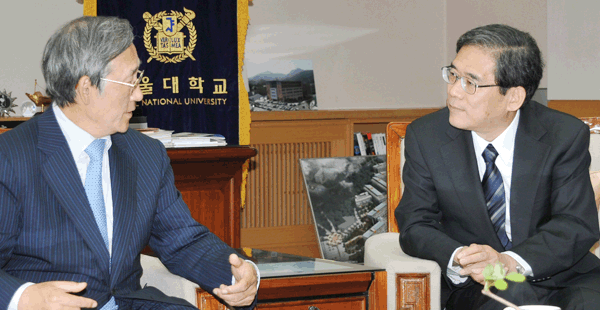
President LEE Jang-Moo said that Seoul National University will launch a pilot program this fall to help senior citizens with post-retirement plans as the country rapidly develops into an aging society.
Lee said the program will initially be short-term but the university eventually plans to develop it into an academic degree.
“It is time to research how to spend a fruitful post-retirement period,” said Lee in a talk with Junichi Hamada, president of the University of Tokyo, last Friday. Lee proposed that the University of Tokyo and Peking University collaborate on developing the academic program for senior citizens after Seoul National’s short-term program ends.
Hamada said he is willing to allow his faculty to participate in joint projects with public universities in Korea and China, adding that professors of medicine, engineering and sociology at his university are conducting coordinated studies into the aging society.
A common issue between the two university heads was “boosting global competitiveness,” which both agree is the key to consistent progress in academia. Lee said SNU has hired 150 overseas professors, while it only had 67 earlier last year. The university is also providing multiple degrees after forming relationships with universities such as Duke, Beijing and Tsinghua, adding that it used video lectures delivered by academics at universities in Tokyo, Berlin and Michigan.
The head of the University of Tokyo said the school had 296 professors from abroad last year, and plans to raise the number to as high as 1,300 in the long term. The school, which ranked 19th in the world university assessment conducted last year by The Times of Britain, has almost 10 times the number of foreign students in its doctorate degree program than Seoul National. In terms of the portion of total enrollment of foreigners to local students, the percentage for Tokyo University is 17 percent, against 7 percent at Seoul National University. Seoul National University and Peking University jointly ranked 50th in the same survey.
Tokyo’s edge was partially possible thanks to sizable government subsidies. “You shouldn’t just focus on short-term achievements but support long-term projects. The Japanese government tries to listen to the opinions of universities and provide large-scale financial aid,” Hamada said, mentioning the seven Nobel Prize winners his university has produced so far.
Lee agreed. “The best academic achievement comes when challenging high-risk studies with a long-term perspective,” he said.
“Of course universities should make related efforts but more importantly the government should be willing to foster pure science. The breakthroughs in pure science can bring enormous opportunities for the economy.”
June 26, 2009
SNU PR Office

